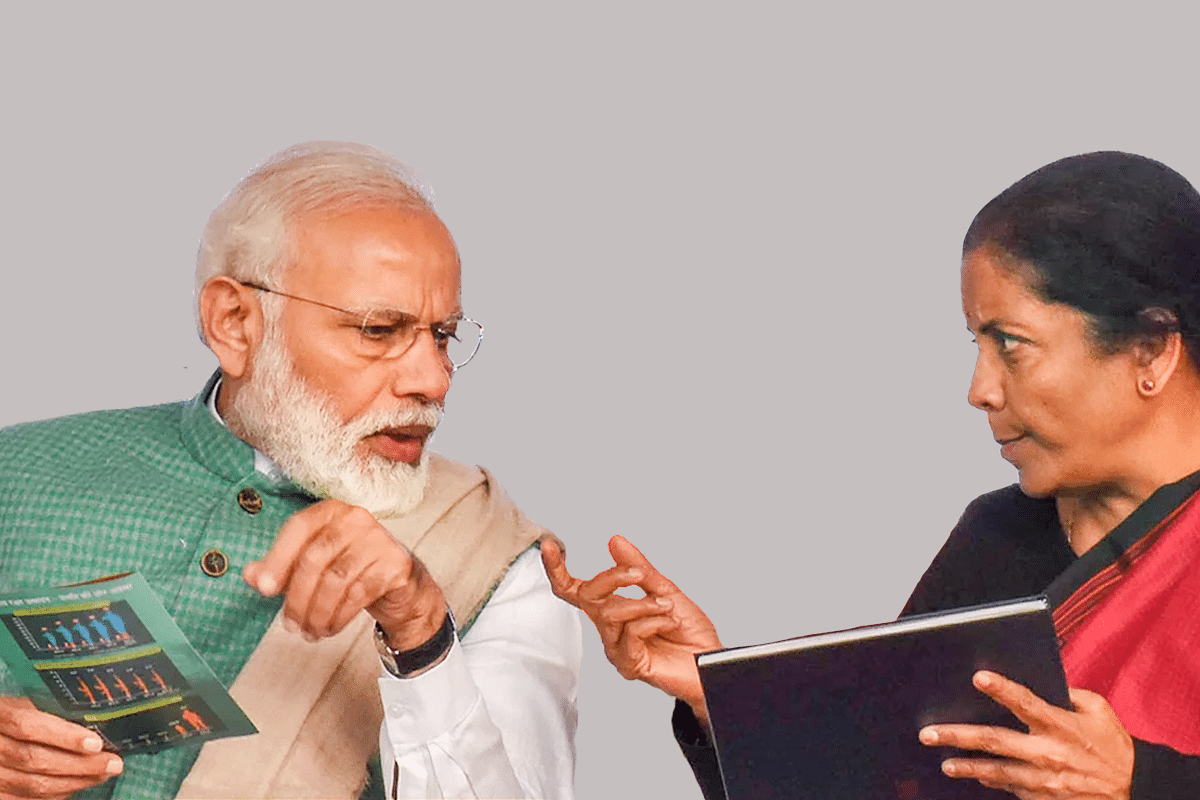Economy
Fixing The Financial, Telecom And Real Estate Sectors Is Critical To Economic Recovery
- Policy interventions in the financial, real estate and telecom sectors can have significant benefits for the recovery process.

Prime Minister Narendra Modi with Finance Minister Nirmala Sitharaman.
Over the last few weeks there has been little discussion on the state of the economy even as there were visible signs of a slow but steady economic recovery. It is, therefore, important to discuss the state of the economy and what is likely to have happened in third quarter (Q3) of the fiscal year.
A word of caution though, we are talking about the third fiscal quarter and one should wait to see how things evolve in China before any analysis of growth in the fourth quarter.
There were signs that economic activity was resuming in China, however, the recent spike in coronavirus cases merits one to be cautious with any preliminary data that is coming out at the moment.
Growth in Q3 was expected to be better, and many including myself had stated that recovery would begin from the third quarter.
However, none expected that the slowdown would be so sharp and to our surprise, the recovery seems to be rather slow at the moment. As Q3 growth is expected to be close to 5.2-5.4, one needs to delve deeper into the factors that are acting as bottlenecks to a swift recovery.
The forecast is conservative, and the interval has been kept on the lower side as one does not realistically expect growth to be at 5.6 per cent, and it is best to be conservative rather than be overtly optimistic.
In fact, certain models seem to hint at a 5-5.4 per cent growth print for the third quarter. Therefore, we can safely expect growth to be above 5 per cent but it is best to anticipate it to be lower than 5.5 per cent.
This is definitely an improvement over the previous quarter and there are early signs of discretionary consumption picking up along with sum improvements in production activity.
But the prospects of recovery also depend on what happens in Q4 as an improvement in Q3 must be followed by a higher growth rate in Q4.
Unfortunately, the risks posed by coronavirus makes it difficult to state with certainty whether this would be possible.
But for now, let us focus only on Q3 and some domestic challenges that are important to be addressed in order to further support economic recovery – and perhaps, accelerate the process.
So far our policies have focused on revival of growth rate and they have found some success. Now we need to shift our attention to policies that will get us back to a 7 per cent or above growth rate sooner without damaging our medium term growth prospects by compromising on macroeconomic stability.
Three sectors can be critical and policy interventions in these areas can have significant benefits for the recovery process. They are the financial sector (primarily banking and non-banking financial companies), the real estate sector and the telecom sector.
These three drivers of growth have been facing numerous challenges for a while now and there are political and economic reasons for adequate policy interventions to address them sooner rather than later.
To be fair, the government has taken some steps to address challenges faced by these sectors and reports suggest that they are working to address the concerns of telecom sector.
However, we need more to be done in the form of a policy package that takes a macro-economic view rather than just looking at these sectors in isolation.
Indeed, economic recovery is underway, however, it is slow at a time when we aspire to build a $5 trillion economy.
The good news is that the current regime does not limit economic policy-making to just the process of annual budget.
Therefore, some policy interventions and appropriate action can be expected over the course of the coming year.
Moreover, the Reserve Bank of India seems to be working towards supporting growth through measures such as ‘operation twist’ and ‘long-term repo operations’.
It has become evident that our monetary and fiscal managers have recognised the need for a coordinated and coherent policy response, which must be viewed as a welcome change.
Support Swarajya's 50 Ground Reports Project & Sponsor A Story
Every general election Swarajya does a 50 ground reports project.
Aimed only at serious readers and those who appreciate the nuances of political undercurrents, the project provides a sense of India's electoral landscape. As you know, these reports are produced after considerable investment of travel, time and effort on the ground.
This time too we've kicked off the project in style and have covered over 30 constituencies already. If you're someone who appreciates such work and have enjoyed our coverage please consider sponsoring a ground report for just Rs 2999 to Rs 19,999 - it goes a long way in helping us produce more quality reportage.
You can also back this project by becoming a subscriber for as little as Rs 999 - so do click on this links and choose a plan that suits you and back us.
Click below to contribute.
Latest